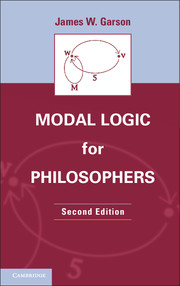Book contents
- Frontmatter
- Contents
- Preface to the Second Edition
- Preface
- Introduction: What Is Modal Logic?
- 1 The System K: A Foundation for Modal Logic
- 2 Extensions of K
- 3 Basic Concepts of Intensional Semantics
- 4 Trees for K
- 5 The Accessibility Relation
- 6 Trees for Extensions of K
- 7 Converting Trees to Proofs
- 8 Adequacy of Propositional Modal Logics
- 9 Completeness Using Canonical Models
- 10 Axioms and Their Corresponding Conditions on R
- 11 Relationships between the Modal Logics
- 12 Systems for Quantified Modal Logic
- 13 Semantics for Quantified Modal Logics
- 14 Trees for Quantified Modal Logic
- 15 The Adequacy of Quantified Modal Logics
- 16 Completeness of Quantified Modal Logics Using Trees
- 17 Completeness Using Canonical Models
- 18 Descriptions
- 19 Lambda Abstraction
- 20 Conditionals
- Answers to Selected Exercises
- Bibliography of Works Cited
- Index
20 - Conditionals
Published online by Cambridge University Press: 05 June 2014
- Frontmatter
- Contents
- Preface to the Second Edition
- Preface
- Introduction: What Is Modal Logic?
- 1 The System K: A Foundation for Modal Logic
- 2 Extensions of K
- 3 Basic Concepts of Intensional Semantics
- 4 Trees for K
- 5 The Accessibility Relation
- 6 Trees for Extensions of K
- 7 Converting Trees to Proofs
- 8 Adequacy of Propositional Modal Logics
- 9 Completeness Using Canonical Models
- 10 Axioms and Their Corresponding Conditions on R
- 11 Relationships between the Modal Logics
- 12 Systems for Quantified Modal Logic
- 13 Semantics for Quantified Modal Logics
- 14 Trees for Quantified Modal Logic
- 15 The Adequacy of Quantified Modal Logics
- 16 Completeness of Quantified Modal Logics Using Trees
- 17 Completeness Using Canonical Models
- 18 Descriptions
- 19 Lambda Abstraction
- 20 Conditionals
- Answers to Selected Exercises
- Bibliography of Works Cited
- Index
Summary
Why Conditional Logics Are Needed
This chapter describes a number of different logics that introduce a two-place operator (Ó, ⇒, or >) to help represent conditional expressions – expressions of the form: if A, then B (or of related forms such as the subjunctive conditional: if A were to be the case, then B would be). But why are such logics needed? Why not simply handle conditionals using the symbol → for material implication? The rules for → (namely, Modus Ponens and Conditional Proof) are quite intuitive. Furthermore, we know that the system of propositional logic that employs these rules is sound and complete for a semantics that adopts the material implication truth table embodied in (→).
(→) aw(A→B)=T iff aw(A)=F or aw(B)=T.
So it appears that → is all we need to manage ‘if .. then’.
On the other hand, objections to the idea that material implication is an adequate account of conditionals have been with us for almost as long as formal logic has existed. According to (→), A→B is true when A is false, and yet this is hardly the way ‘if A then B’ is understood in natural language. It is false that I am going to live another 1,000 years, but that hardly entails the truth of (1).
(1) If I am going to live another 1,000 years, then I will die tomorrow.
When A and B are incompatible with each other as in this case, the normal reaction is to count ‘if A then B’ false, even when the antecedent A is false. This illustrates that in English, the truth of ‘if A then B’ requires some sort of relevant connection between A and B. When A and B are incompatible, as they are in (1), there is no such connection, and so we reject ‘if A then B’.
- Type
- Chapter
- Information
- Modal Logic for Philosophers , pp. 430 - 462Publisher: Cambridge University PressPrint publication year: 2013



